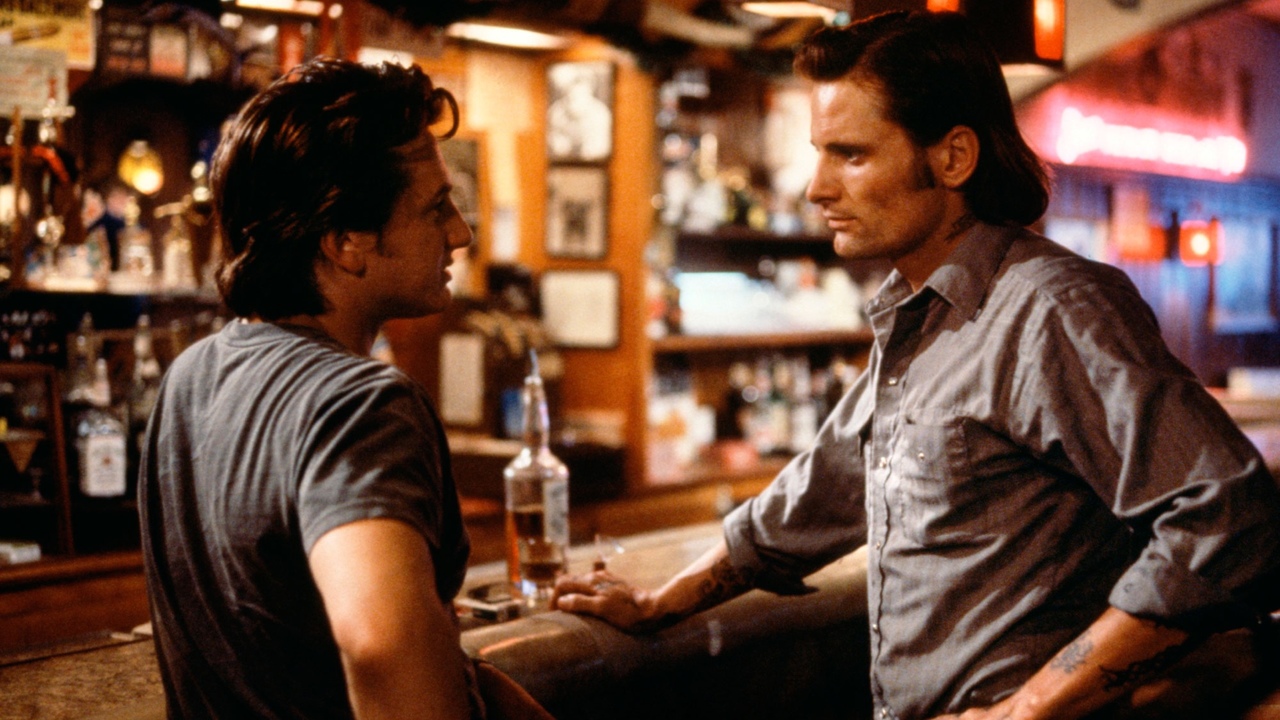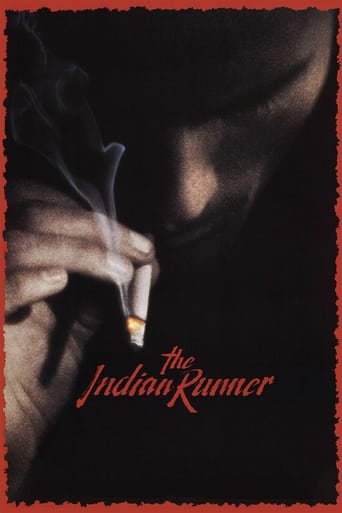

Pretty Good
... View MoreThe film makes a home in your brain and the only cure is to see it again.
... View MoreThe movie is wonderful and true, an act of love in all its contradictions and complexity
... View MoreThe film's masterful storytelling did its job. The message was clear. No need to overdo.
... View More**WARNING! SPOILERS!** An overall very sad and touching picture. A few over-the-top sad songs are not to my personal liking, apart from that the music score works very well.A police officer, Joe (played by David Morse) tries to do the right thing. He wants to pull his little brother out of a life of crime and help him get back on track. With both their mother and father gone, he really wants to get closer to him. Sadly, his little brother Frank (Viggo Mortensen) is too far gone.I find this movie to be an important reminder that there are people like Frank out there, and just staying away from them is for the best. Some of them, like the Frank character, really want to be left alone. Having a wife and kids is not for them. They are destructive. They will eventually tear down everyone who are involved with them.Mortensen gives a very accurate portrayal of the type of character he plays. Having personally known a few individuals which are very much the same sort (although not being criminals), I can tell his performance is spot-on. Except for a very few moments where he does become emotional, he is very close to being a sociopath. He is violent and abusive towards his girlfriend/wife (Patricia Arquette), a very sweet, naive and innocent character. There are some bright moments. He does attempt an honest living. But he is not content and slips back into his own misery. Sitting in a bar and drinking while his wife is giving birth to their child follows a final confrontation with Joe (and a reminder of how convincing both Morse and Mortensen really are). Despite his best efforts, he's not able to convince Frank to change his ways nor his bleak outlook on life. Finally, Frank crosses the line and there is no way back. The exact psychological reasons for why the bartender (Dennis Hopper) is killed? I don't know, but being a morbid frame of mind doesn't really need an excuse for killing people."I knew I'd never see or hear from Frankie again. He turned his back on himself and his family. I went home that night, watered my garden. Kissed my baby. I held my wife until morning. Life is good...My brother Frank."
... View MoreThin story concerns two small town brothers and their struggles over family honor. David Morse is the responsible, straight-laced cop and 'good' brother; Viggo Mortensen, the 'bad' boy, is a former soldier and ex-convict. As an actor (particularly in his earliest years), Sean Penn seems to have modulated his performances under the Method. Turning first-time writer and director for this arty, obtuse drama, he works his script and characters out through the same methodical process, slowing the pacing down to a crawl (ostensibly so we can catch every nuance and inflection). This approach might be fascinating if there were three-dimensional characters to care about, but photogenic Morse and Mortensen aren't really convincing as siblings. Worse, we expect more from prominently-billed veterans Charles Bronson and Sandy Dennis, who hardly get a chance to come through with anything interesting. The picture is balky with turgid sequences, a wobbly narrative and confusing editing (always slanted to point up the artistic excesses). Penn's tricks with the camera show off a talented eye, yet they are mostly an irritation. *1/2 from ****
... View MoreWay back in the nineteen-fifties, Neil Sedaka had a song a hit song that told how breaking up is hard to do. As I watched this film, for the first time recently, I wondered whether Sean Penn, the writer/director, had been humming that tune as he wrote the script. That's not meant to be a disparaging question, simply because all ideas have to have a genesis somewhere, and a song actually did inspire this story...Highway Patrol Man from Bruce Springsteen, so I'm told.Thinking about the theme however redolent of the biblical clash between Cain and Abel, perhaps I can't but feel that while Penn might have set out to make a fundamental statement about why some people do bad things, he ended up showing, instead, that a failure to come to terms with the world is merely an indication of immaturity, a failure to leave childhood behind. To that extent, the film succeeds, but it may have been unintentional.The story, as implied, is well recognized: a good brother (Joe, played by David Morse) who is a cop tries to help his younger and wild brother (Frank, played by Viggo Mortensen) overcome his inner demons upon his return from the Vietnam war, in 1963 or thereabouts. Despite all his efforts, Joe is unable to get Frank to change his anti-social behaviour. Eventually, there is a parting of the ways.What makes the film distinctive is, first, the very competent acting by Morse, Mortensen, Valeria Golino as Joe's wife, Maria, and Patricia Arquette as Dorothy, Frank's girlfriend. Second, Sandy Dennis and Charles Bronson appear briefly as the brothers' parents, with both older actors much subdued in their performances as you might expect. Third, the setting is well located in some small towns in Iowa and Nebraska, providing the necessary backdrop for Frank's dislike of settling down into a job, something that he despises. Finally, the script is well-written and rings true for most of the time, I think; in a crucial bar scene between the brothers towards the end, however, when Frank finally explains the essence of his angst, it left this viewer somewhat perplexed. Joe's response is, in a nutshell: Get over it! Me too...Some of the back-story done via old home movies tells us that Frank was a bit of a hooligan anyway and sometimes a violent one; a number of his actions, upon return from the war, bolster that viewpoint. So, psychologically, Frank is a bit of a muddle, but maybe that's Penn's point. And, although, there is no specific reference to the after-effects of Vietnam upon returning soldiers, I cannot help feeling there is an implied message that what happens in the story is not all Frank's fault. But, I could be wrong.However, just how the brothers come to part, finally, forms the multi-layered plot, with all the gruesome violence, coarse language and nudity including a full frontal shot of Mortensen for maybe ten seconds. Not until half-way, does filmdom's favorite crazy, Dennis Hopper, appear as Caesar, a coarse, philosophizing bar-tender to whom Frank takes a dislike, with predictably violent results. And that action sets up the denouement for when Frank must leave: break away from his extended family and make his own way, on his own terms, in an increasingly violent world. In that sequence, Joe finally sees Frank as he really is: a little boy, with two toy guns, ready to fight all-comers. From that perspective, the allusion to The Indian Runner is overblown, because that implies a sense of lost times, a romantic past, an independence of spirit that was noble, more or less. In the context of Frank's psychology however, I think Penn stretched the metaphor way out of proportion to the reality of the action.Unless, of course, Penn's own philosophy is fundamentally nihilistic and hence much like Frank's...Technically, though, the film is well done, with excellent editing and special effects; add to that, a host of old country and western oldies on the sound track, perfectly in keeping with small town America.I very much admire Morse and Mortensen as actors, the latter reminding me of a young Jack Nicholson, while Morse has the size and demeanour of a young Martin Milner. Cinematically, they are a well matched pair for this story, with the physical disparities adding to the emotional and intellectual chasm that separates them forever. It's a sad story, yes, but there is, nevertheless, hope left behind as the tail-lights of Frank's car fade to black.Not recommended for children at all.
... View MoreFamily strife happens everywhere, in "The Indian Runner" it explains itself very well. Here you have two brothers one's a sheriff(David Morse) who handles problems; a Vietnam veteran(Viggo Mortensen) who is a problem. Joe Roberts is a sheriff who looks a life in a very positive way despite crime. Frank Roberts is a Vietnam vet who is so distraught, he can't function in society. He's hot-headed, rebellious, and mean-spirited. Things really go downhill when their father(Charles Bronson) commits suicide. Then Frank makes things even worse when he goes out to a bar, and killed a guy with a chair. Not only that, he leaves his wife and his newborn son. He would a been a great father if he hasn't been such a hot-head. It goes to say, "You got a lot to learn" Frank will be learning things the hard, HARD WAY! The nighttime scenes are cool. I like the part where the Indian runs across the road. The movie makes sense, and it's got some meaning to go along with. 5 stars!
... View More